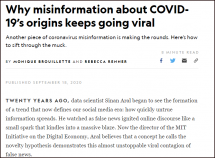Why Misinformation about COVID-19’s Origins Keeps Going Viral
Despite the objections of experts to the publication of articles before they have been peer reviewed, this report states,that pre-reviewed articles and other types of misinformation have gained traction on social media because they take advantage of vulnerable human emotions. Those feelings can drive the viral spread of hoaxes.
The author provides several reasons why misinformation spreads easily:
- The way people react to emotional stories on social media is intense and predictable. Vitriol fills the replies, and false news then becomes 70 percent more likely to be retweeted than the truth.
- A complicated combination of psychological factors is at work whenever a reader decides to share news, and otherwise smart people can become part of the cycle of disinformation.
- Readers cut corners, often sharing stories with grabby headlines before looking deeper into the story itself.
- If you hear something twice, you’re more likely to think that it’s true than if you’ve only heard it once
- Political news travels faster than the rest of false news
Last modified: April 5, 2022
Language: English

